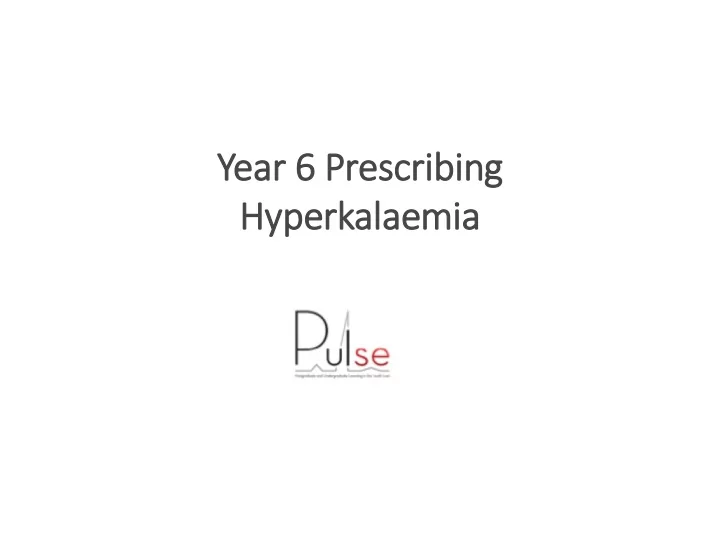

Year ear 6 P 6 Pres escribing Hyp yper erkal alae aemia
Conten Co ents Using one scenario to discuss the • assessment and management of hyperkalaemia Focus on giving you the opportunity to • prescribe for this scenario
Objec ectives es To be able to briefly discuss the assessment • and management of hyperkalaemia To be be able ble to o pre prescrib ibe app pprop opriately ly for r • hype yperkalaemia a at th the le leve vel o l of an FY FY1
Sc Scen enar ario 1 1 You are the FY1 in combined assessment. A patient has been admitted by the registrar in A&E with vomiting and dehydration. His bloods are: ◦ FBC FBC: Hb 150, WCC 11, Platelets 350 ◦ U&Es: s: Urea 13, Creatinine 110, Sodium 130, Potassium 7.1 You have established that the blood sample was not taken from his drip arm. The patient’s vomiting has settled.
Backgr Bac kground PMH MH: ◦ IHD ◦ MI’s two years ago and ten years ago Medic icatio tion his istory ory: ◦ Aspirin 75mg orally daily ◦ Ramipril 10mg orally daily ◦ Bisoprolol 10mg orally daily ◦ Co-amilofruse 5/40 one tablet orally daily ◦ Simvastatin 40mg orally at night ◦ Spironolactone 50mg orally daily ◦ Glyceryl trinitrate 800 micrograms sublingually when required No known drug allergies
On E Exam amination BP 139/78, HR 64, Sats 96% (RA), RR 16, T 37.1 Respi piratory ry: unremarkable CV CVS: HS I+II+0, bilateral pitting oedema to knees Ne Neur uro & o & GI GI: unremarkable
Ques estions What information and investigations do you 1. want? What is your immediate management? 2. What will you prescribe? 3.
Invest stigations ECG Hydration status Signs of cardiovascular instability
EC ECG
Prescribi bing We need to prescribe ◦ Calcium gluconate ◦ Insulin ◦ Nebulisers ◦ Any others?
Immediate M e Man anag agem emen ent Administer calcium gluconate10%, 10ml slow IV (over 2 to 3 minutes) – watch ECG while doing it and titrate the dose according to the ECG Duration of action is anticipated to be 30 to 60 minutes – repeat if required
Insulin Actrapid 10 Units IV in 50mls 50% Glucose over 30 minutes Peak effect of insulin glucose is usually seen within 30 to 60 minutes after the infusion This effect may last for several hours with a rebound in potassium anticipated
Ne Nebulisers Salbutamol 10mg NEB Unlicensed indication Cautious use in patients with cardiovascular disease The effect of nebulised salbutamol can happen within 30 minutes of administration and may last for 2 hour
Monito toring Recheck potassium level in 2 hours and 6 hours after treatment If unable to obtain a blood sample, an arterial gas sample would suffice Capillary glucose (BM’s) MUST be monitored: o Every 15 minutes in the first hour o Every 30 minutes in the second hour o Every hour thereafter for a total of six hours
Other er Regular Medications: Withold medications that can cause hyperkalaemia - ramipril, co-amilofruse and spironolactone Use of code for non-administration code 9 – ‘dose witheld on doctors instructions’ Maintain treatment of underlying cause(s) of hyperkalaemia as clinically indicated Cation-exchange resins (eg: Oral calcium resonium 15g three times daily) may be considered in some slow resolving cases and should always be prescribed with lactulose Consult the Dietetics team for low potassium dietary advice Prior to d/c should review the appropriateness of spironolactone and co-amilofruse (potassium sparing) in light of hyperkalaemia
Summar Su ary Assessment • ECG • Hydration status • Cardiovascular instability • Prescribing • Calcium gluconate • Insulin/glucose • Salbutamol •
Refer eren ences es Management of Hyperkalaemia in Adults http://intranet.lothian.scot.nhs.uk/Directory/emerge ncydepartment- rie/DepartmentalProtocols/NEW%20EM%20Guidelines /Hyperkalaemia%20Treatment.pdf Golden rules for prescription writing http://intranet.lothian.scot.nhs.uk/Directory/Medicin esManagement/Documents/Golden%20rules%20fo r%20prescribing%20V%203.1.pdf
Ques estions?
Feed eedbac ack Please fill in feedback on TUBS Thank you
Recommend
More recommend